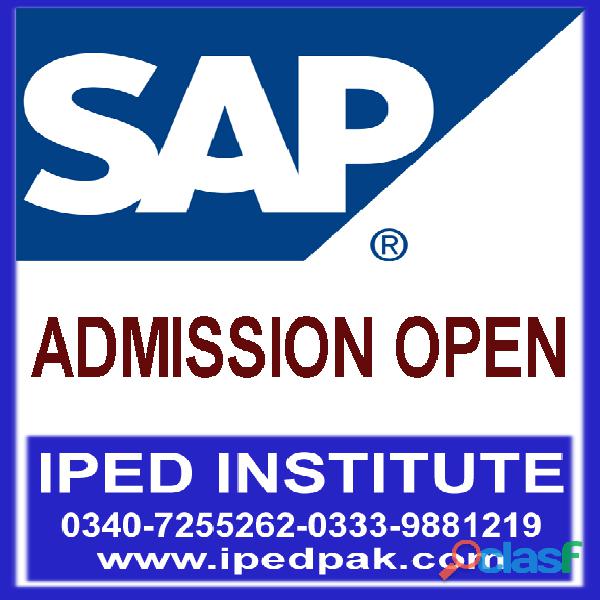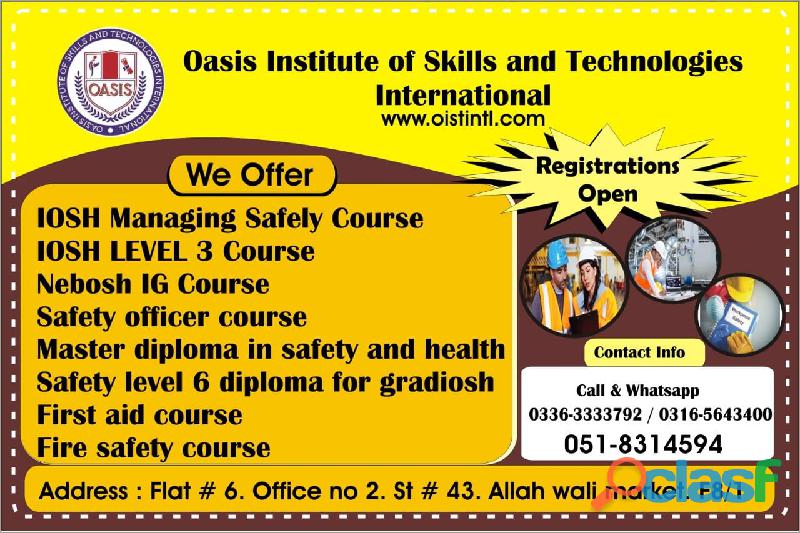SAP COURSE IN RAWALPINDI, SAP COURSE IN ISLAMABAD, SAP COURSE IN PAKISTAN. IN PAKISTAN
Sap Course Content:
Step 1: Administration
This course introduces participants to SAP ERP Training. It provides advanced skills in configuring and using the financial accounting components and assists in understanding the integration of accounting and other components in SAP Training.
Step 2: Financials
Handle all your financial transactions – including general ledger, journal entries, budgeting, and account setup and maintenance – in one system, with comprehensive tools and reports.
Step 3: Sales Oppurtunities
Manage the entire sales process through different sales stages. Track sales opportunities and activities, analyze their outcome, and forecast revenue potential. You can monitor and analyze sales opportunities using dashboards and sales reports.
Step 4: Sales A/R
The A/R invoice streamlines the sales process as it contains all of the required functions found in both a sales order and delivery document. It lists the inventory items bought or services used, discounts issued and delivery information.
Step 5: Purchasing A/P
SAP ERP Purchasing enables you to manage and maintain every aspect of your vendor transactions. Tools and processes include Purchase Order,Purchase Delivery Note,Purchase Quantities,Purchase Return,Purchase Invoice, Purchase Credit note, Landed Costs,
Step 6: Business Partners
SAP ERP Business Partner management allows you to track and manage vital information about your clients and vendors. Capabilities include Masterfile,Business Partner Properties,Parent Child Relationship and Opening Balances.
Step 7: Banking
SAP ERP Banking transactions help you handle all your financial processing, with tools for Receipt Payment toSupplier,Deposits,EFT(Pay your vendors electronically),Cheques for Payment,Reconciliation.
Step 8: Inventory
SAP ERP Inventory where master data of goods to be sold/purchased are maintained and their quantity/value in warehouses are tracked.Manages your inventory, including warehouse inventory, price lists, special pricing agreements, alternative items, and warehouse transactions, as well as the pricing and packaging process, and batches and serial number management.
Step 9: Production
SAP ERP Production Enables you to handle bills of material and production orders.where Bill of Materials master data are maintained and Production orders are created
Step 10: MRP(Material Requirements Planning)
SAP ERP Material Requirements Planning (MRP) manages MRP through a wizard-based process. This process enables users to define a planning scenario in five easy steps and predict demand based on forecasts. Capabilities include Define Forecasts ,Planning Wizard,Order Recommendation Report.
Step 11: Service
SAP ERP Service management optimizes the potential of your service department, providing support for service operations, service contract management, service planning, tracking of customer interaction activities, and customer support. Capabilities include:Service Call,Customer Equipment Card,Service Contract,Knowledge Base,Service Reports -
Step 12: Human Resources
SAP ERP Human Resources where employee master data (Names, contract information, roles, etc.) are maintained.Maintains information on company employees and enables you to perform numerous related functions. It provides staff management capabilities, including employee details, contact information, and absence reports.
Course Duraiton
2 Months
Class Timings
Evening & Morning Shift
Total Fee :
75000/-
Step 1: Administration
This course introduces participants to SAP ERP Training. It provides advanced skills in configuring and using the financial accounting components and assists in understanding the integration of accounting and other components in SAP Training.
Step 2: Financials
Handle all your financial transactions – including general ledger, journal entries, budgeting, and account setup and maintenance – in one system, with comprehensive tools and reports.
Step 3: Sales Oppurtunities
Manage the entire sales process through different sales stages. Track sales opportunities and activities, analyze their outcome, and forecast revenue potential. You can monitor and analyze sales opportunities using dashboards and sales reports.
Step 4: Sales A/R
The A/R invoice streamlines the sales process as it contains all of the required functions found in both a sales order and delivery document. It lists the inventory items bought or services used, discounts issued and delivery information.
Step 5: Purchasing A/P
SAP ERP Purchasing enables you to manage and maintain every aspect of your vendor transactions. Tools and processes include Purchase Order,Purchase Delivery Note,Purchase Quantities,Purchase Return,Purchase Invoice, Purchase Credit note, Landed Costs,
Step 6: Business Partners
SAP ERP Business Partner management allows you to track and manage vital information about your clients and vendors. Capabilities include Masterfile,Business Partner Properties,Parent Child Relationship and Opening Balances.
Step 7: Banking
SAP ERP Banking transactions help you handle all your financial processing, with tools for Receipt Payment toSupplier,Deposits,EFT(Pay your vendors electronically),Cheques for Payment,Reconciliation.
Step 8: Inventory
SAP ERP Inventory where master data of goods to be sold/purchased are maintained and their quantity/value in warehouses are tracked.Manages your inventory, including warehouse inventory, price lists, special pricing agreements, alternative items, and warehouse transactions, as well as the pricing and packaging process, and batches and serial number management.
Step 9: Production
SAP ERP Production Enables you to handle bills of material and production orders.where Bill of Materials master data are maintained and Production orders are created
Step 10: MRP(Material Requirements Planning)
SAP ERP Material Requirements Planning (MRP) manages MRP through a wizard-based process. This process enables users to define a planning scenario in five easy steps and predict demand based on forecasts. Capabilities include Define Forecasts ,Planning Wizard,Order Recommendation Report.
Step 11: Service
SAP ERP Service management optimizes the potential of your service department, providing support for service operations, service contract management, service planning, tracking of customer interaction activities, and customer support. Capabilities include:Service Call,Customer Equipment Card,Service Contract,Knowledge Base,Service Reports -
Step 12: Human Resources
SAP ERP Human Resources where employee master data (Names, contract information, roles, etc.) are maintained.Maintains information on company employees and enables you to perform numerous related functions. It provides staff management capabilities, including employee details, contact information, and absence reports.
Course Duraiton
2 Months
Class Timings
Evening & Morning Shift
Total Fee :
75000/-
4.00/5
1 reviews




CONTACT




